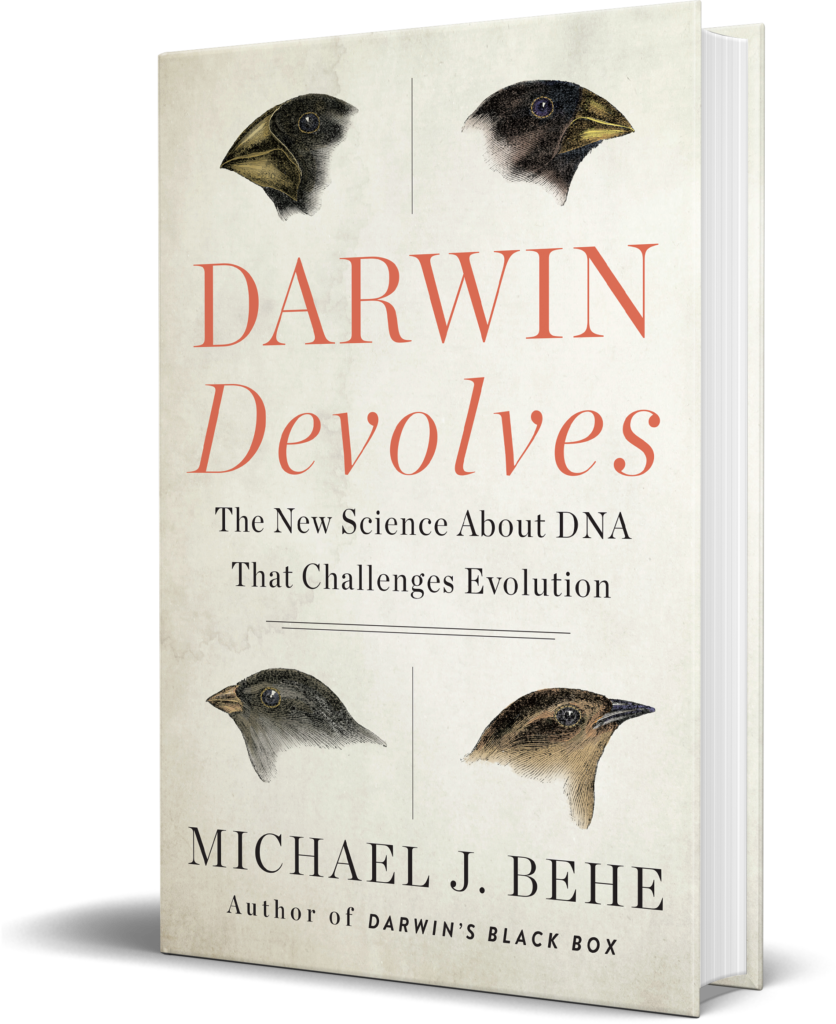 In American Association for the Advancement of Science’s magazine, Science, we read,
In American Association for the Advancement of Science’s magazine, Science, we read,
In the grand scheme of evolution, mutations serve only to break structures and degrade functions, Behe argues. He allows that mutation and natural selection can explain species- and genus-level diversification, but only through the degradation of genes. Something else, he insists, is required for meaningful innovation. Here, Behe invokes a “purposeful design” by an “intelligent agent.”
There are indeed many examples of loss-of-function mutations that are advantageous, but Behe is selective in his examples. He dedicates the better part of chapter 7 to discussing a 65,000-generation Escherichia coli experiment, emphasizing the many mutations that arose that degraded function—an expected mode of adaptation to a simple laboratory environment, by the way—while dismissing improved functions and deriding one new one as a “sideshow” (1). (Full disclosure: The findings in question were published by coauthor Richard Lenski.) Nathan H. Lents , S. Joshua Swamidass , Richard E. Lenski, “A biochemist’s crusade to overturn evolution misrepresents theory and ignores evidence” at Science
Who are the reviewers? Readers may remember Nathan Lents from his book, Human Errors: A Panorama of Our Glitches, from Pointless Bones to Broken Genes, which prompted the legitimate question, “Does Nathan Lents, author of a “bad design” book really teach biology? (A doctor looks at his claims about the human sinuses).” Pathologist and biomedical engineer Joshua Swamidass has long been associated with theistic evolution group Biologos, though maybe not so much now. Richard Lenski is a respected researcher and NAS member who runs multi-generation evolutionary experiments on bacteria.
If you know a bit of the history of the debate, two things stand out from the review. As author Michael Behe observes,
In a few days I will offer a detailed rebuttal. But the overwhelmingly important point to notice right up front is that the reviewers (Lenski plus Josh Swamidass over at Peaceful Science and John Jay College biologist Nathan Lents) have absolutely no response to the very central argument of the book. The argument that I summarized as an epigraph on the first page of the book so no one could miss it. The one that I included in the title of a 2010 Quarterly Review of Biology article upon which the book is based. The one for which I chose the most in-your-face moniker that I could think of (consistent with the professional literature) to goad a response: The First Rule of Adaptive Evolution: Break or blunt any gene whose loss would increase the number of offspring. The rule summarizes the fact that the overwhelming tendency of random mutation is to degrade genes, and that very often is helpful. Thus natural selection itself acts as a powerful de-volutionary force, increasing helpful broken and degraded genes in the population. Michael Behe, “Woo-hoo! In Science Review of Darwin Devolves, Lenski Has No Response to My Main Argument” at Evolution News and Science Today
Odd indeed. Claims around reproductive fitness (increasing the number of offspring) form the bulk of the news we hear around Darwinism. It’s supposed to explain how you vote, shop, and tip at restaurants, never mind why the peacock has a spectacular but useless tail. So the audience for the review (and the book) is presumably familiar with the concept. Do the reviewers, peers in the field, not have a response? They comment on just about everything else Behe has done.
Second, overall, the language of the review reminded some of us of something we’d heard before and it was easily traced: Lents and Swamidass had been struggling in public on how to do a hit on Behe’s book. And they came up with some of these ideas, served up to Science as leftovers from a blog that took root in the ruins of a previous blog apparently founded in response to someone getting dumped as a commenter here at Uncommon Descent. (Look, we agree that the soap opera is dull; our notes are just for the record. Watch the ball instead.)
If the only purpose for accepting this review was to convince Science readers that Darwinism, the central dogma of evolution, is not simply collapsing, I believe that the review will succeed. Many researchers want nothing more than to get their grant and go through the approved motions to present the approved research, maybe get the desired positions. If information is in an approved paper, it will look like fact to them. Yes, that’s a racket, but what else is there?
On the other hand, if you are in a position that you can afford to know more of the bigger picture of why Darwinism isn’t working anymore, get Darwin Devolves and examine carefully Behe’s central point – the very one the Science reviewers chose to omit discussing: The First Rule of Adaptive Evolution: Break or blunt any gene whose loss would increase the number of offspring. Is it correct?
In these times, are you better off knowing the problems or innocently citing approved sources of misinformation as your reason for making decisions? You decide.
As we said earlier this week, “Hello? Darwin’s world is collapsing around us, snowflakes. See Suzan Mazur’s new book Darwin Overthrown: Hello Mechanobiology and the Dissent from Darwinism list now topping 1000 career scientists. And these are unrelated events we heard about just this week, never mind all the others of the last two decades.”
See also: Mike Behe’s New Book, Darwin Devolves: “Absolutely Convincing” Or “Omits Contrary Examples”
From our files:
Protein families are still improbably astonishing – retraction of Matlock and Swamidass paper in order?
Biologist Wayne Rossiter on Joshua Swamidass’s claim that entropy = information
Inference Review did not set out to make a fool of cosmologist Adam Becker